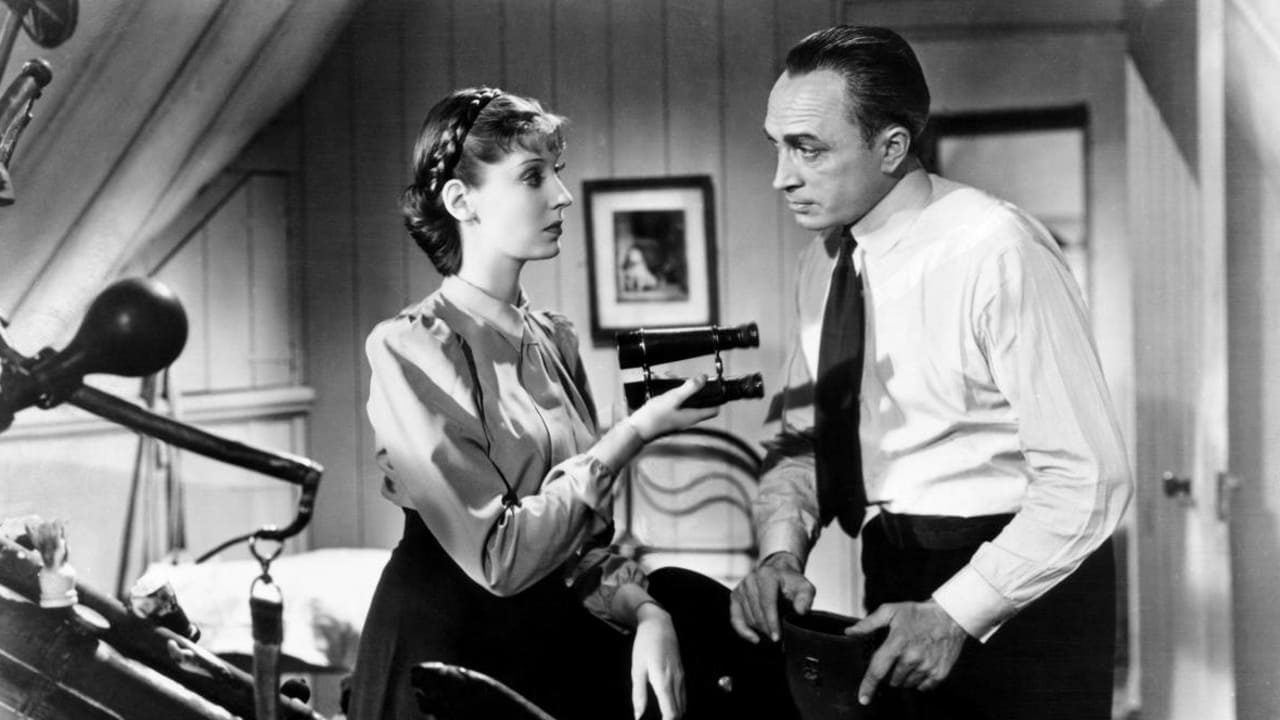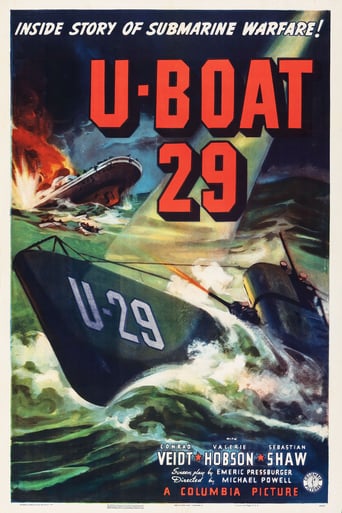



Best movie ever!
I cannot think of one single thing that I would change about this film. The acting is incomparable, the directing deft, and the writing poignantly brilliant.
View MoreIt's the kind of movie you'll want to see a second time with someone who hasn't seen it yet, to remember what it was like to watch it for the first time.
View MoreStory: It's very simple but honestly that is fine.
This British film is set during WWI...WWII wouldn't begin for another few months after the film's domestic debut in March, 1939. But I am sure it played well during WWII--both because it's darned entertaining and also because the Germans are the baddies in this one.The film begins with a school teacher being abducted by two German agents. Then, a German submarine commander (Conrad Veidt) is sent on a mission to Britain that has everything to do with that school teacher. The woman was being sent to work in Scotland...very near to the British Navy base. So the faux teacher's job is to assist the submarine commander in his mission when he sneaks ashore. How does it all work out? Well, suffice to say exceptionally well...but I won't say more about that.The movie has lots of good things about it. Conrad Veidt was an exceptionally good actor and here he really was at his best. The film also looked great--with an exceptional use of matte paintings, great looking sets and real ships! Additionally, while I hate the use of stock footage, here it's really not bad at all. Nothing to dislike about this tense film.
View MoreIt's a surprising movie. It's set in 1917, in the middle of the First World War, and it was released in 1939, a year in which Britain was at war with Germany. Yet the opening scenes show us Conrad Veidt and his officers returning from a successful cruise on their U-boat, and they're given a respectable showing, slightly comic. After sixteen days of subsistence on tinned sardines and herring, they cheerfully order a stew at their hotel, only to be told that it's a meatless day. Veidt is treated with respect and even sympathy. They aren't at all the sneering Nazi bastards that would show up in some later war films.Veidt and crew are sent on a mission to the Orkney Islands, near the Grand Fleet, where they will meet a young woman who is a German agent. Cut to a young woman on her way to the Orkney Islands to become the new head school mistress. The young lady is June Duprez. She's one of those British actresses, like Merle Oberon, who, from certain angles, are so near feminine perfection that they defy description. Duprez' eyes are catlike, only lacking vertical pupils. Neither she nor Oberon had careers that really took off, probably because they were mediocre actresses. Yet -- yum.Is June Duprez the spy that Veidt is meant to contact? Certainly not. In fact, Duprez' is etherized, kidnapped by the innocent-seeming German agents and held in a remote stone cottage, while a agenuine German agent substitutes herself. The agent is Valerie Hobson. Now, Hobson herself is no slouch when it comes to pulchritude, but it's a qualitatively different order of attractiveness. Duprez looks like she should be seated on your lap and stroked. Hobson's beauty is arid, elongated, elegant and impenetrable. If she were any more statuesque she'd look as if being drawn through a black hole in space. Her appeal is of the genre that suggests any intimacy between you might lead to your having a red rubber ball strapped in your mouth. Later, when Veidt puts some moves on the fake schoolteacher, she shoes him off and says, "You're not one of my pupils." Hm.Veidt's submarine makes its way the the Isle of Hoy in the Orkneys and he goes ashore on a motorbike to rendezvous with the local German agent. While rehearsing the plans with his officers he's compelled to recite "Die Lorelei", a poem by Heinrich Heine, which I once thought was just an anonymous folk song. Heine, who died in 1851, was one of Germany's best-known poets and one of the good guys in that the Nazis hated his work and burned his books. Anyway, the officers get a kick out of seeing their stern captain spout poetry.On the island, Hobson puts Veidt up in a room. Veidt refuses to remove his uniform. "If I'm going to be shot, it will be as an officer, not a spy." He doesn't know it but he's stumbled into a trap, a little too complicated to explain. Everything turns out to the advantage of the British, but the Germans, however many mistakes they make, are never deprived of dignity and pride. The print available on YouTube is one of the most crisply defined I've watched. The model work is of the period but there are some fine shots of destroyers and cruisers at sea. All in all, it's a well-made and thoroughly entertaining film.
View MoreIf one really wants to get a glimmer of what Conrad Veidt's career would have been like in American cinema but for the coming of World War II just as he came to Hollywood, look at his British films from 1934 to 1940. In many respects his best work was done then - he had a wider variety of roles, and was not typecast as villains as frequently as he was in the U.S. Among the films that I'd recommend watching is THE SPY IN BLACK.In World War I, Veidt is the commander of a U.Boat sent to Scottish waters. He is told that there is a British naval officer who is willing to betray the Grand Fleet at Scapa Flow. Veidt is shown interacting with his crew at the beginning, but he goes by life boat to the land, and meets his contact Valerie Hobson. She introduces him to Sebastian Shaw, the naval officer. Shaw seems to be drowning his anger in liquor, but he is prepared to give Veidt a naval document about a sortie by the Grand Fleet on a particular date, which would pass a narrow point the U-Boat would be stationed at. Veidt would then be in a position to sink several of the British dreadnoughts in what would be the worst disaster to strike the fleet since U-Boat Commander Weddigen sank the Hogue, Aboukir, and Cressy in September 1914.It's too good to be true. But gradually Veidt realizes it isn't true. He's been set up, and Shaw and Hobson are trying to capture him. And the film becomes a chase - with Veidt running amongst the islanders in the Hebrides. But his conflict is that of the gentlemanly type. He will use force, if necessary, to still reach his boat and crew and try to do some damage to his enemy's ships. But he is not by nature cruel. A telling moment in the film is late in it, when he commandeers a ferry boat. He is armed and he tells the adults that he won't hesitate to use his gun if necessary. But having said that he hears the crying of a baby that one of the woman on the ferry is carrying, and his voice softens as he says that he certainly will not war against the innocent. Veidt never said anything like that in his Hollywood films - few Nazis (as he himself would have been the first to point out from private knowledge) would have hesitated in hurting an enemy's child or baby.The film was the best that Veidt made playing an enemy officer in either world war. It ends tragically, but honorably for the man, as he decides to join his crew for the last time.
View MoreJust wanted to second the other user's comment.I saw this last night as part of a Michael Powell/Emeric Pressberger retrospective underway at the American Cinemetheque. There are some unlikely aspects to the plot, but on the whole this is well crafted WWI thriller with a remarkable level of moral complexity, especially given that it was made and released just as England was entering a second war against Germany.The protagonist (hero?) (played by the extraordinary Conrad Veidt) is a German officer on a spy mission and he is, in many respects, a quite admirable character. For the first half of the film, it's almost entirely from his point of view. It's hard to imagine Hollywood filmmakers EVER having the confidence that Powell and Pressberger clearly had in the intelligence of their audience, allowing them to actually like and admire an enemy agent.While "The Spy in Black" eventually does come down squarely on the side of the English, the agents of the Kaiser come off only as perhaps a hair more ruthless than those fighting for king and country.Of course, the Germany that England would be fighting within a few a few months would be far, far worse. This film is a potent reminder that while World War II might have a morally clear "good" war because of the vast evil of the Nazis, World War I was a horse of a far grayer color.With sophisticated, occasionally black humor, this is a neat bit of old-fashioned movie entertainment with some genuinely intriguing differences. Enthusaistically recommended.
View More